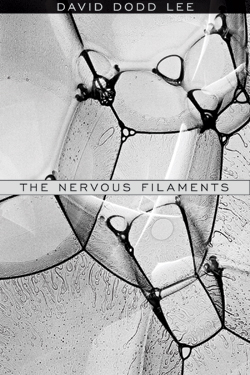
paper • 96 pages • 15.95
ISBN-13: 978-1-884800-05-4
The word “Filament,” taken from David Dodd Lee’s title The Nervous Filaments, suggests both a fine thread
and the element of a light bulb that can be heated to incandescence, and appropriately so, as each of these
illuminated poems acts as a thread in a finely woven collection. Together they create a cultural commentary
that is at once wry and satirical while still teeming with emotion. “One of the new jobs we have is dating // you
work in reality TV—// the myth of the soul mate,” Dodd writes, but is the soul mate a myth? Still wary, Dodd
says “Love is a form of gambling,” yet allows emotion to make its way in: “Pushing the linens back / we
conceive a love.” This is the beauty of these poems: Dodd is able to find underlying truth and emotion in a
sometimes artificial and frenzied world, as when a speaker declares “I know I woke up / and the sun was
staring at me // Orange Juice // it’s all about packaging // And the mockingbird knows something at 2 a.m.”
Lee’s poems explore both presence and absence, or, rather, what is present in the space created by absence: “I
have this candle and what she left on it // her smell.” The juxtaposition of stark imagery in The Nervous
Filaments creates an acute sense of longing and loss: “She got the call at ten ‘oh’ seven // every child in her
class began evaporating . . . // no good bye kiss // not even a word // driving and driving over long bridges.” We
are continually left with a haunted feeling that the voices in these poems feel as we feel, and that they
experience what we have or will experience.
“Models Demand and Mutate,” from The Nervous Filaments:
“Lee’s fourth book is hard to interpret, but hard to ignore: ‘a priest shouldn’t have a tattoo of Darth Vader,’ the title poem remarks, before depicting ‘little silver penguins holding trays.’ Exclamatory, vivid, bizarre, and sometimes redolent of the surrealists, Lee’s single-line stanzas and sentence fragments suggest a life impossible to sustain, a set of emotions and recollections unmoored from any life story that might serve as guide: ‘They shredded the moon again she said about the falling snow.’ Lee remains conscious of region and locale (‘just think of the Midwest/ as a giant Nativity Scene’): yet his ambitions, and his targets, seem to take in almost everything he can see. A style that some readers find disorienting will seem to others all too familiar; it’s not clear whether his disorienting style is really anything new. And yet Lee’s sharp way with single images, single sentences, almost convulsively fleeting visions, should not be denied. (Mar.)’” —Publishers Weekly
“David Dodd Lee’s new solo exhibition is as electric and unsettling as anything the art world has seen in years. Urgent, indifferent, his lines scatter in all directions as you read them […] You may need to leave the tv on for company while you read. You will find yourself coming back again and again.” —Jordan Davis
“Once in a while, a book of poems is so unmemorable that I forget it’s in my hands; once in a longer while, a book will stick in me like a spear. A grievous and gorgeous tour of things-have-gone-to-pieces-since-you-left-me America, David Dodd Lee’s The Nervous Filaments is most certainly of the latter class. There is no sleep so deep I would not hear it there.” —Graham Foust
“Imagistic, passionate, and uncompromising, David Dodd Lee’s poems are simultaneously in the here-and now while being otherworldly. He transforms the harsh realities we experience as brutal and permanent into transient informative moments of release. […] This poet reminds us over and over: you are not alone; and it is assured as his readers invite him in that their sensibilities will deepen and expand.” —Christine Garren